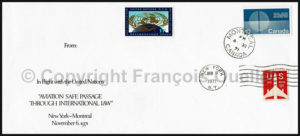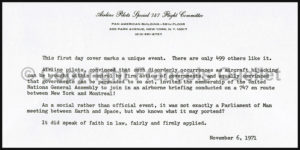Le titre est une traduction de l’anglais « Airline Pilots Special 747 Flight Committee ».
Je me suis procuré ce pli premier jour il y a trente ans. Il n’avait pas vraiment de valeur monétaire mais certainement une valeur historique pour quiconque s’intéresse à l’aviation et à l’histoire de la poste aérienne.
Suite à de nombreux détournements d’avions dans différents pays, des détournements qui auraient facilement pu être évités, les pilotes en eurent assez de cette situation et décidèrent de prendre les choses en main. Les pilotes et politiciens ensemble firent en sorte de progressivement changer la situation.
Des lois internationales furent modifiées et la sécurité accrue, autant aux aéroports que dans les avions.
Le site de l’OACI traitant de ce vol est en anglais. Voici tout de même une portion du texte, pour les personnes bilingues.
“The series of skyjacking incidents, several of them desperate and dramatic, was a great and particular concern for the Air Line Pilots Association (ALPA, Member of IFALPA, the largest airline pilot union in the world representing pilots from U.S. and Canadian airlines); ALPA sought an innovative step and an extraordinarily direct method to intensively lobby influential politicians from all over the world, as the fundamental problem in advancing a solution to the skyjacking problem laid in the realm of politics. A Boeing 747 sponsored by ALPA was rented from Pan Am and nearly 300 United Nations personnel flew on Saturday 6 November 1971 on a short international flight from New York to Montréal, being the home of ICAO; the aircraft was piloted by Captain Stanley L. Doepke of Pan Am. More than 30 crewmembers who had been skyjacked placed these world political leaders in a controlled and dramatic situation where they could hear their stories. All the international politicians from the UN General Assembly who accepted ALPA’s hospitality on the Montréal excursion went home vowing immediate action by their countries. A special first day cover was issued to commemorate this unique event and a medal was given to the UN Delegates. More information on this issue can be obtained by clicking on the following link: Hijacked Pilots Urge UN Action.
However, even with these two new Conventions signed in 1971, the issue on sanctions was not sufficiently addressed and a few terrorist actions early in 1972 gave rise to grave concern and threat to the safety of civil aviation; it was felt that perpetrators of such acts were not or not appropriately brought to justice. Because governments had failed to deal adequately with such hijacking, the International Federation of Airline Pilots’ Associations (IFALPA) called for a world-wide 24-hour shutdown of services by pilots on 19 June 1972. The United States pressed in the ICAO Council for rapid action to complete the work on a convention which would provide for sanctions against states that did not punish hijackers. The ICAO Council adopted on 19 June 1972 a Resolution which directed the Legal Committee to convene immediately a special Subcommittee to work on the preparation of an international convention to look at this issue of sanctions.”

